
Romanic Review
Scope & Guideline
Fostering Innovative Research in Romance Cultures
Introduction
Aims and Scopes
- Exploration of Literary Theory and Criticism:
The journal engages deeply with literary theory, examining how texts interact with philosophical concepts and cultural contexts. This includes discussions on existential themes, translation poetics, and the role of literature in shaping identity. - Interdisciplinary Studies:
It emphasizes interdisciplinary approaches, integrating perspectives from history, philosophy, and cultural studies, particularly in relation to French and Iberian literature. - Focus on Translation and Adaptation:
The journal explores the nuances of translation, not only as a linguistic exercise but also as a creative and interpretative act that shapes literary meaning and cultural exchange. - Cultural and Historical Contextualization:
Papers often contextualize literary works within their historical and cultural frameworks, analyzing how socio-political factors influence literary production and reception. - Engagement with Contemporary Issues:
The journal addresses contemporary themes such as digital literacy, globalization, and issues of race, gender, and identity, reflecting current academic discourse.
Trending and Emerging
- Intersections of Literature and Digital Culture:
Recent publications indicate a growing interest in how digital platforms and technology influence literary production and consumption, showcasing themes like digital literacy and the impact of social media on literary forms. - Translation as a Creative Process:
There is an emerging focus on translation not just as a linguistic task but as a creative and interpretative process that reshapes texts, emphasizing the role of translators as cultural mediators. - Exploration of Identity and Intersectionality:
Increasing attention is being given to themes of identity, including race, gender, and sexuality, reflecting broader societal discussions and the need for inclusive narratives in literary studies. - Global Perspectives in French Studies:
The journal is expanding its scope to include global frameworks within French and Francophone studies, highlighting diversity and the complexities of cultural interactions in a globalized world. - Contemporary Reinterpretations of Classic Texts:
There is a trend towards reinterpreting classical texts through modern lenses, addressing issues like colonialism, gender dynamics, and existential themes, making them relevant to today's readers.
Declining or Waning
- Traditional Historical Analysis:
There seems to be a decline in purely historical analyses of texts without a contemporary or interdisciplinary lens, as the journal increasingly favors approaches that connect literature to current societal issues. - Narrowly Defined Literary Genres:
Interest in narrowly defined genres or styles, such as traditional romanticism or classical forms, appears to be decreasing as the journal expands its scope to include more diverse and experimental literary forms. - Focus on Canonical Authors Alone:
There is a noticeable shift away from exclusively focusing on canonical authors, with less frequent publications centered solely on figures like Baudelaire or Proust, in favor of broader discussions that include marginalized voices.
Similar Journals
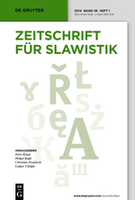
ZEITSCHRIFT FUR SLAWISTIK
Exploring the Depths of Slavic Culture and LanguageZEITSCHRIFT FUR SLAWISTIK, published by WALTER DE GRUYTER GMBH, is a renowned journal focusing on Slavic studies, encompassing various fields such as cultural studies, linguistics, and literary theory. With its ISSN 0044-3506, this distinguished journal has been a significant contribution to the academic community since its inception in 1956, continuing to disseminate valuable research until 2024. While maintaining a strong reputation within several academic categories, ZEITSCHRIFT FUR SLAWISTIK holds a Q3 ranking in Cultural Studies and Linguistics and Language, and a Q2 ranking in Literature and Literary Theory as of 2023. This positioning underscores the journal’s impact, particularly as it caters to an audience of researchers, professionals, and students invested in the rich tapestry of Slavic culture and language. Access to this journal is not open; however, its comprehensive articles are crucial for anyone aiming to explore and deepen their understanding of Slavic linguistic and literary traditions. The journal's work is essential in fostering cross-disciplinary dialogue and advancing scholarship in these vital areas.
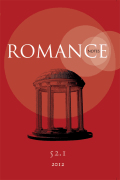
ROMANCE NOTES
Empowering Voices in the Realm of Romance StudiesROMANCE NOTES is a prominent journal published by the University of North Carolina, dedicated to the study of Literature and Literary Theory. Since its inception in 1975, the journal has evolved to encompass critical and interdisciplinary perspectives on romance languages, examining both classic and contemporary texts. Aiming to bridge scholarly discourse and literary practice, ROMANCE NOTES invites contributions that explore various dimensions of language, culture, and artistic expression, making it an essential resource for researchers, professionals, and students alike. With an established presence in the academic community and a current ranking of Q3 in its category for 2023, it serves as a vital platform for emerging scholarship. The journal, based in Chapel Hill, North Carolina, continues to foster a rich dialogue within the field, offering an invaluable contribution to the understanding of romance languages and their literary significance.
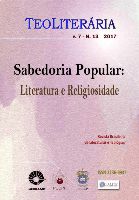
Teoliteraria-Revista Brasileira de Literaturas e Teologias
Innovating Scholarship at the Crossroads of Literature and FaithTeoliteraria-Revista Brasileira de Literaturas e Teologias is a distinguished open-access journal published by the Pontifícia Universidade Católica de São Paulo (PUC-SP), dedicated to the interdisciplinary exploration of literature and theology. Since its establishment in 2011, this journal has been pivotal in fostering dialogue between literary studies and theological discourse, offering scholars a platform for innovative research and thought-provoking articles. With its ISSN 2236-9937, Teoliteraria prides itself on promoting academic rigor and diversity in scholarship, making it an indispensable resource for researchers, professionals, and students pursuing insights at the intersection of these rich fields. Located in São Paulo, Brazil, the journal is easily accessible to a global audience, underscoring its commitment to knowledge dissemination and scholarly collaboration.
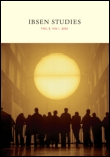
Ibsen Studies
Connecting Scholars Through Ibsen's Enduring LegacyIbsen Studies, published by ROUTLEDGE JOURNALS, TAYLOR & FRANCIS LTD, is an esteemed peer-reviewed journal dedicated to the exploration and critical analysis of the works and influence of playwright Henrik Ibsen. With an ISSN of 1502-1866 and E-ISSN of 1741-8720, this journal serves as a vital platform for scholars and researchers in the fields of Literature and Literary Theory and History, holding prestigious categorization in the 2023 quartiles—Q1 in Literature and Literary Theory and Q2 in History. The journal, which converges its focus from the year 2000 to 2024, features high-quality research that enriches our understanding of Ibsen’s legacy and his impact across various contexts. The journal's robust rankings in Scopus—placing it in the 73rd percentile for Literature and Literary Theory—underscore its significant contribution to academic discourse. Researchers, professionals, and students alike will find Ibsen Studies a critical resource for advancing their knowledge and engaging with contemporary scholarship on one of the most influential playwrights in modern drama.

Samuel Beckett Today/Aujourd'hui
Exploring the Depths of Beckett's Literary GeniusSamuel Beckett Today/Aujourd'hui is a distinguished academic journal published by BRILL that focuses on the rich and multifaceted literature surrounding the works of Samuel Beckett. Based in the Netherlands, this peer-reviewed journal has established itself as an essential resource in the field of Literature and Literary Theory, evidenced by its impressive Q2 ranking in the 2023 category quartiles and a solid standing in the Scopus rankings, placing it within the top 59th percentile among its peers. Addressing critical interpretations, cultural contexts, and theoretical explorations of Beckett's oeuvre, it seeks to foster scholarly discourse and inspire further research and engagement. Although not an open-access publication, Samuel Beckett Today/Aujourd'hui attracts researchers, professionals, and students alike with its commitment to advancing the understanding of Beckett's literary contributions from 2001 through 2024 and beyond.

Jordan Journal of Modern Languages & Literature
Elevating Research in Linguistics and Literary TheoryJordan Journal of Modern Languages & Literature is a prestigious academic journal published by Yarmouk University, Deanship of Research & Graduate Studies. This journal serves as a vital platform for scholars and researchers in the fields of linguistics and literature, offering a well-rounded examination of modern languages and literary theory. With an impressive Q2 ranking in Linguistics and Language and a Q1 distinction in Literature and Literary Theory as of 2023, it consistently features high-quality research that contributes to the advancement of knowledge in these domains. The Scopus rankings further reflect its academic rigor, placing it in the 79th percentile for Literature and Literary Theory and maintaining significant influence in related fields, making it an essential resource for researchers, professionals, and students alike. Although it does not operate under an open-access model, the journal's commitment to publishing groundbreaking studies can significantly aid in the understanding and progression of modern linguistic and literary practices. The Jordan Journal of Modern Languages & Literature continues to be an influential voice in fostering scholarly dialogue and advancing research in the humanities.
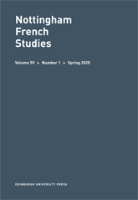
NOTTINGHAM FRENCH STUDIES
Illuminating the Intersections of Language and CultureNOTTINGHAM FRENCH STUDIES is a distinguished academic journal published by Edinburgh University Press, focusing on the diverse realms of French language, literature, culture, and history. With its ISSN 0029-4586 and E-ISSN 2047-7236, the journal serves as a vital platform for scholarly discourse, featuring interdisciplinary research that bridges gaps between Cultural Studies, Linguistics, and Literary Theory. Notable for its robust performance, it holds a Q3 ranking in Cultural Studies and Linguistics and a Q2 ranking in Literature and Literary Theory as of 2023, placing it among the key publications within its field. Throughout its publication span from 1996 to 2024, NOTTINGHAM FRENCH STUDIES has consistently catered to the academic community with insightful articles, enriching the understanding of French cultural contexts. While it is not an Open Access journal, its contributions are pivotal in advancing scholarly dialogue and fostering critical perspectives, making it an essential resource for researchers, professionals, and students engaged in French studies and its interdisciplinary connections.

Monteagudo
Exploring the Frontiers of Arts and HumanitiesMonteagudo, published by UNIV MURCIA, is an important academic journal dedicated to the fields of Arts and Humanities, particularly focusing on Literature, Literary Theory, Visual Arts, and Linguistics. Since its inception in 2019, it has aimed to provide a scholarly platform for innovative research and critical discourse within these disciplines. With an ISSN of 0580-6712 and an E-ISSN of 1989-6166, the journal seeks to enhance the visibility of emerging ideas and methodologies, while fostering an inclusive academic dialogue. Although Monteagudo does not currently offer Open Access options, its significance is reflected in its Scopus rankings, which position it within the 14th to 32nd percentile across various categories. With its operations based in the heart of Murcia, Spain, the journal is poised to influence both regional and international scholarly conversations, making it an essential resource for researchers, professionals, and students aiming to expand their understanding of contemporary issues in Arts and Humanities.
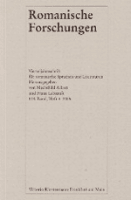
ROMANISCHE FORSCHUNGEN
Cultivating Critical Inquiry in Romance PhilologyROMANISCHE FORSCHUNGEN, published by VITTORIO KLOSTERMANN GMBH, stands as a key scholarly journal in the fields of linguistics and literary studies, focusing particularly on Romance languages and literature. With an ISSN of 0035-8126 and an E-ISSN of 1864-0737, this journal is vital for researchers and scholars seeking to explore and advance their understanding of the nuances within Romance language studies. Operating from its base in Frankfurt am Main, Germany, ROMANISCHE FORSCHUNGEN features a robust publication history from 2002 to 2024. While currently categorized in Q4 within both Linguistics and Language and Literature and Literary Theory for 2023, the journal aims to cultivate a scholarly dialogue that bridges these disciplines, fostering an environment for innovative and critical inquiry. Although not an open-access journal, it serves as a crucial resource for professionals and students dedicated to Romance philology and comparative literature.
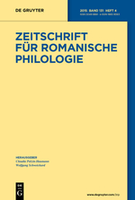
ZEITSCHRIFT FUR ROMANISCHE PHILOLOGIE
Illuminating the Intricacies of Romance Linguistics and LiteratureZEITSCHRIFT FUR ROMANISCHE PHILOLOGIE, published by Walter de Gruyter GmbH, stands as a prominent peer-reviewed journal dedicated to the fields of Linguistics, Literature, and Literary Theory. Established in 1877 and continuing its legacy to the present day, this esteemed journal offers a platform for comprehensive scholarship that explores the intricacies of Romance languages and their literary heritage. With a notable Q1 ranking in Literature and Literary Theory and a Q2 ranking in Linguistics and Language, it has secured its place among leading resources in the humanities. Researchers, educators, and students benefit from its rich historical context and current contributions to the understanding of Romance languages and literature. Though currently not available as Open Access, the journal prioritizes the dissemination of high-quality research, making significant strides in fostering academic dialogue and advancement. Its address at Genthiner Straße 13, Berlin, Germany, situates it in a hub of scholarly activity, bridging the past with contemporary literary discourse.